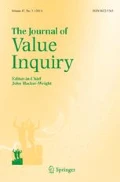Conclusion
Is the 20th Century as obviously preferable to all other times as Rawls would have us assume? Is 20th Century Stockholm preferable to 12th Century Florence in each and every way? In 12th Century Florence men lived without liberty or equality. Yet Florentines were reasonably happy, accepted their place in life, and communicated directly with others.Footnote 1 It was a society with sharply marked class distinctions. In such a society the lowly can gain more self-respect through identity, excellence, and capacity within their station than in an egalitarian society. The lowly can perceive the importance of their labour, be secure that their place is assured by powerful protectors, see models of virtue to admire, and derive a sense of contributing to a meangingful social drama. They may also learn something of the difference between the noble and the ignoble. Are these not qualities Aristotle would appreciate? Medieval man was certainly not free but 'sneither was he alone and isolated ... Man was rooted in a structuralized whole, and thus life had a meaning which left no place, and no need, for doubt.Footnote 2 In a brief reference to feudalism Rawls himself seems to realise this state of affairs (74). In contrast, Stockholm is a competitive society where loneliness, anxiety, and identity crises have been endlessly documented by social scientists, all occurring despite the high material standard of living. Yet Stockholm would seem to be the model for Rawls and obviously not Florence. One wonders if this social scientific knowledge of Stockholm will be part of the knowledge available to persons in the original position.Footnote 3
Justice is not quantitative but qualitative, so Aristotle might say in a brief discussion. In a just society a person's possessions and consumptions are not on the minds of the other people with whom they meet and treat. When Odysseus came home he was delighted to climb into a peasant's cart to ride the last mile home. Contrast this king with King Arthur riding with another peasant on another road, choking with the anxiety that he may not be acting kingly by being in the cart. In Ithaca both king and commoner were sure of each other and, more importantly of themselves.
Similar content being viewed by others
Notes
R. Dworkin, ‘The Social Contract’, The Sunday Times, 9 July 1972, p. 31.
Eric Fromm, Escape From Freedom (New York: Rinehart, 1941), p. 41.
One critic lauds Rawls's grasp of the social sciences, but perhaps he is not serious, see Hugo Bedau, ‘Rawls’, Nation, 11 September 1972.
Author information
Authors and Affiliations
Rights and permissions
About this article
Cite this article
Jackson, M.W. Aristotle on Rawls: A critique of quantitative justice. J Value Inquiry 19, 99–110 (1985). https://doi.org/10.1007/BF00151422
Issue Date:
DOI: https://doi.org/10.1007/BF00151422



